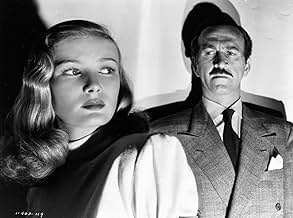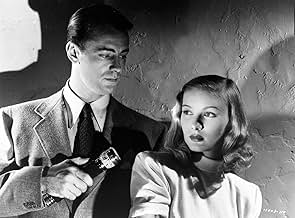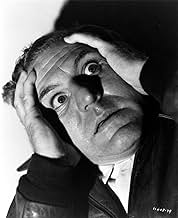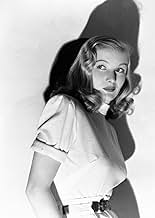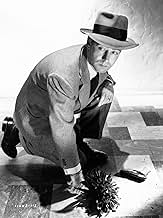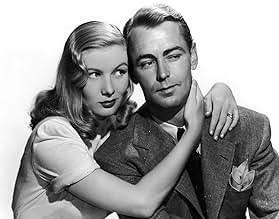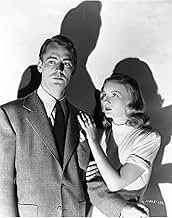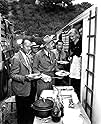NOTE IMDb
7,1/10
10 k
MA NOTE
Ajouter une intrigue dans votre langueAn ex-bomber pilot is suspected of murdering his unfaithful wife.An ex-bomber pilot is suspected of murdering his unfaithful wife.An ex-bomber pilot is suspected of murdering his unfaithful wife.
- Réalisation
- Scénario
- Casting principal
- Nommé pour 1 Oscar
- 1 victoire et 1 nomination au total
Bea Allen
- News Clerk
- (non crédité)
Harry Barris
- Bellhop
- (non crédité)
George Barton
- Cab Driver
- (non crédité)
Mary Bayless
- Bar Patron
- (non crédité)
Edward Biby
- Restaurant Patron
- (non crédité)
Nina Borget
- Mexican Waitress
- (non crédité)
Avis à la une
Raymond Chandler wrote this script and it is him through and through, I think. It's a very bleak tale of returning war veterans' findings when they reach "home." Unfaithful wife, hoodlums, and just general corruption and bleakness. The scenes with Veronica Lake are the shafts of light in this one's blackness (what did you expect, she's Veronica Lake, one of the most beautiful screen starlet ever), but all in all it conjours up dark images in one's mind. I once heard someone argue that this wasn't film noir. I disagree as much as I can. There is much inner struggle in the characters, settings of bleakness, amnesia, corruption everywhere, unfaithful spouses, murders, cops, criminals, and finally the dark visual expression (with rain as an added bonus). Do not miss this film.
Blue Dahlia, The (1946)
** 1/2 (out of 4)
Alan Ladd plays a pilot returning home after serving in WWII only to discover that his wife has been cheating on him. The wife ends up dead and Ladd is the main suspect so he takes off to prove his innocence and this is when he meets the wife (Veronica Lake) of the man who was having an affair with his wife. This film has the reputation of being a classic but I wouldn't hold it up that high as I found some of the plot to be rather boring and many scenes stretched out too long. With that said, the film does offer up some nice performances and fans of noir will probably want to check it out. I think the main reason to watch the film is for the performance of Ladd. He manages to be very believable in the role and I loved how laid back he was no matter what was going on. He could be flirting with Lake or fighting off some thugs but he remains the same level of calmness throughout. As for Lake, I wouldn't say she gives a good performance but she fits her role just fine. William Bendix and Hugh Beaumont play Ladd's buddies who also return home with him. I found Bendix to be quite good in his role, although I think the "monkey music" dialogue gets a bit old. Howard Da Silva, Howard Freeman, Doris Dowling and Tom Powers do nice work as well. The film contains some pretty good cinematography and director Marshall is able to build up a nice atmosphere throughout. The biggest problem I had with the film is that it really doesn't try to be anything that we haven't seen before. The dialogue isn't the strongest and it's pretty obvious who the killer is from the first time we see him. That is, the original killer. The studio changed the ending of the film and the new killer doesn't work at all and it comes across incredibly forced and stupid. So, either way, the ending really doesn't work because had they kept the original killer then it was way too obvious. The way they changed the killer comes off very silly. Either way, Ladd makes the film worth viewing at least once.
** 1/2 (out of 4)
Alan Ladd plays a pilot returning home after serving in WWII only to discover that his wife has been cheating on him. The wife ends up dead and Ladd is the main suspect so he takes off to prove his innocence and this is when he meets the wife (Veronica Lake) of the man who was having an affair with his wife. This film has the reputation of being a classic but I wouldn't hold it up that high as I found some of the plot to be rather boring and many scenes stretched out too long. With that said, the film does offer up some nice performances and fans of noir will probably want to check it out. I think the main reason to watch the film is for the performance of Ladd. He manages to be very believable in the role and I loved how laid back he was no matter what was going on. He could be flirting with Lake or fighting off some thugs but he remains the same level of calmness throughout. As for Lake, I wouldn't say she gives a good performance but she fits her role just fine. William Bendix and Hugh Beaumont play Ladd's buddies who also return home with him. I found Bendix to be quite good in his role, although I think the "monkey music" dialogue gets a bit old. Howard Da Silva, Howard Freeman, Doris Dowling and Tom Powers do nice work as well. The film contains some pretty good cinematography and director Marshall is able to build up a nice atmosphere throughout. The biggest problem I had with the film is that it really doesn't try to be anything that we haven't seen before. The dialogue isn't the strongest and it's pretty obvious who the killer is from the first time we see him. That is, the original killer. The studio changed the ending of the film and the new killer doesn't work at all and it comes across incredibly forced and stupid. So, either way, the ending really doesn't work because had they kept the original killer then it was way too obvious. The way they changed the killer comes off very silly. Either way, Ladd makes the film worth viewing at least once.
Although riddled with improbabilities, Raymond Chandler's tough story and script is well served with a glossy look and the hard-edged performances drawn by director George Marshall from a superior cast. THE BLUE DAHLIA concerns a recently discharged military man Johnny Morrison (Alan Ladd) who returns home to find his wife Helen (Doris Dowling) has been as unfaithful as the day is long--and is presently carrying on with club owner Eddie Harwood (Howard da Silva), over whom her hold is not entirely romantic. After stomping out into the rain, Morrison learns Helen has been murdered, and must race to prove his innocence before the coppers pick him up.
Ladd would give considerably more sophisticated performances in his later years, but he strikes all the right ultra-tough chords, and although Veronica Lake is a rather wooden actress she is remarkably beautiful and as a team the pair has considerable chemistry. The standouts in the cast, however, are Da Silva, who gives the role of the heavy a surprising interpretation, and William Bendix, who plays Ladd's war-wounded buddy to great effect.
THE BLUE DAHLIA lacks both the moodiness and grittiness of truly great film noir, so it is not in the first rank of the genre--but it is no less enjoyable for that. The film cracks along at a rapid pace with plenty of action and a surprise twist or two that will keep you guessing to the very end. Ladd and Lake fans will love it, and any one who likes the hardboiled style will be in for a real treat. Recommended.
Gary F. Taylor, aka GFT, Amazon Reviewer
Ladd would give considerably more sophisticated performances in his later years, but he strikes all the right ultra-tough chords, and although Veronica Lake is a rather wooden actress she is remarkably beautiful and as a team the pair has considerable chemistry. The standouts in the cast, however, are Da Silva, who gives the role of the heavy a surprising interpretation, and William Bendix, who plays Ladd's war-wounded buddy to great effect.
THE BLUE DAHLIA lacks both the moodiness and grittiness of truly great film noir, so it is not in the first rank of the genre--but it is no less enjoyable for that. The film cracks along at a rapid pace with plenty of action and a surprise twist or two that will keep you guessing to the very end. Ladd and Lake fans will love it, and any one who likes the hardboiled style will be in for a real treat. Recommended.
Gary F. Taylor, aka GFT, Amazon Reviewer
"The Blue Dahlia" (1946) is a film noir directed by George Marshall and stars Alan Ladd, Veronica Lake, William Bendix, Howard Da Silva and Will Wright. It was the third pairing of the box-office bombshells Ladd and Lake and it is a marked improvement on their previous two outings, "This Gun for Hire" and "The Glass Key", both from 1942. The key credit to this should probably go to scriptwriter Raymond Chandler, probably the best hardboiled crime novelist there ever was along with Dashiell Hammett.
The story is classic noir: Johnny Morrison (Ladd), war veteran of the South Pacific, returns home to find his wife (Doris Dowling) has been unfaithful. He walks out on her, and shortly after she is found dead. His war buddies Buzz Wanchek (William Bendix) and George Copeland (Hugh Beaumont) believe he is innocent, but everything points towards to Morrison...
The screenplay has some vintage Chandler lines, and characters like Bendix's disturbed veteran and Wright's marvelously smarmy house peeper could have jumped out of his Philip Marlowe novels. However, the ending is weak due to interference from the U.S. military, but the movie as a whole still packs a sizable punch. Director Marshall serves his material admirably and cinematographer Lionel Lindon gives us some very dark and atmospheric shots. Acting wise, Bendix takes the top honours, but Ladd and Lake are both very good, as is Howard Da Silva, owner of the eponymous "Blue Dahlia Club" .
This film noir is one definitely to check out.
The story is classic noir: Johnny Morrison (Ladd), war veteran of the South Pacific, returns home to find his wife (Doris Dowling) has been unfaithful. He walks out on her, and shortly after she is found dead. His war buddies Buzz Wanchek (William Bendix) and George Copeland (Hugh Beaumont) believe he is innocent, but everything points towards to Morrison...
The screenplay has some vintage Chandler lines, and characters like Bendix's disturbed veteran and Wright's marvelously smarmy house peeper could have jumped out of his Philip Marlowe novels. However, the ending is weak due to interference from the U.S. military, but the movie as a whole still packs a sizable punch. Director Marshall serves his material admirably and cinematographer Lionel Lindon gives us some very dark and atmospheric shots. Acting wise, Bendix takes the top honours, but Ladd and Lake are both very good, as is Howard Da Silva, owner of the eponymous "Blue Dahlia Club" .
This film noir is one definitely to check out.
"The Blue Dahlia" is a flower and a nightclub, both of which figure in the plot of this 1946 film starring Alan Ladd, Veronica Lake, William Bendix and Howard da Silva. There's plenty of the busy, somewhat chaotic post-war atmosphere in this movie as war pals Johnny Morrison (Ladd), Buzz Wanchek (Bendix) and George Copeland (Hugh Beaumont) return from service. While the brain-damaged Buzz and Copeland get an apartment together, Morrison returns to his beautiful wife (Doris Dowling) whom he finds has been living a wild, party-filled existence and cheating on him with club owner Eddie Harwood (da Silva). Hurt and angry, Morrison, trying to get a cab in the rain, is picked up by none other than a beautiful blond named Joyce, who he does not know is actually Mrs. Harwood. After parting company, they both stay at the same inn without realizing it. The next morning, Morrison hears on the radio that his wife is dead, and the police are looking for him. On the run, and with some help from Joyce, Morrison tries to find out who really killed his wife.
This is a pretty good noir with a solid, effective performance from Ladd and excellent work by both Bendix and da Silva. There are plenty of suspects, too - viewers will have their pick. Though "The Blue Dahlia" is a decent noir, it's the frenetic post-war energy that makes it watchable rather than the story, which as one reviewer here pointed out, has the strange coincidence of Johnny being picked up by Mrs. Harwood. The other odd thing to this viewer, anyway, is the fact that the Bendix character is so obviously brain-damaged from the war (he has a plate in his head), yet no one seems to really pick up on it, or at least acknowledge it, until later in the film. He's told to pull himself together and allowed to drink. Meanwhile, loud music drives him nearly insane, and he suggests getting on a bus, not remembering he just got off of it.
The Veronica Lake role is criticized - it's true she doesn't have much to do; it's also true that not many people liked working with her; and that she wasn't the world's greatest actress (Raymond Chandler called her Moronica), but she and Ladd made a great, if short, team, and she was always beautiful to look at and listen to.
All in all, worth watching for one of the great noir teamings and some good performances.
This is a pretty good noir with a solid, effective performance from Ladd and excellent work by both Bendix and da Silva. There are plenty of suspects, too - viewers will have their pick. Though "The Blue Dahlia" is a decent noir, it's the frenetic post-war energy that makes it watchable rather than the story, which as one reviewer here pointed out, has the strange coincidence of Johnny being picked up by Mrs. Harwood. The other odd thing to this viewer, anyway, is the fact that the Bendix character is so obviously brain-damaged from the war (he has a plate in his head), yet no one seems to really pick up on it, or at least acknowledge it, until later in the film. He's told to pull himself together and allowed to drink. Meanwhile, loud music drives him nearly insane, and he suggests getting on a bus, not remembering he just got off of it.
The Veronica Lake role is criticized - it's true she doesn't have much to do; it's also true that not many people liked working with her; and that she wasn't the world's greatest actress (Raymond Chandler called her Moronica), but she and Ladd made a great, if short, team, and she was always beautiful to look at and listen to.
All in all, worth watching for one of the great noir teamings and some good performances.
Le saviez-vous
- AnecdotesThe pressure of having to finish the screenplay combined with the curveball of having to write an entirely new ending was too much for Raymond Chandler. He quickly came down with a severe case of writer's block. According to a near-legendary story, Chandler offered to finish the screenplay by working drunk; in exchange for sacrificing his health to produce the requisite pages on time, Chandler was permitted to work at home (a privilege rarely granted to screenwriters) and was provided two chauffeured cars, one to convey the completed pages to the studio and the other for his wife. Chandler turned the script in on time. Many now believe the drunkenness was simply a ruse by Chandler to wrangle extraordinary privileges from the desperate studio.
- GaffesJoyce tells Johnny that the tide is out. Clearly the tide is all the way in, completely covering the beach.
- Citations
Joyce Harwood: Well, don't you even say 'Good night'?
Johnny Morrison: It's "good-bye", and it's tough to say good-bye.
Joyce Harwood: Why is it? You've never seen me before tonight.
Johnny Morrison: Every guy's seen you before somewhere. The trick is to find you.
- ConnexionsFeatured in The Hollywood Collection: Alan Ladd: The True Quiet Man (1999)
Meilleurs choix
Connectez-vous pour évaluer et suivre la liste de favoris afin de recevoir des recommandations personnalisées
- How long is The Blue Dahlia?Alimenté par Alexa
Détails
Box-office
- Montant brut aux États-Unis et au Canada
- 2 700 000 $US
- Durée
- 1h 36min(96 min)
- Couleur
- Rapport de forme
- 1.33 : 1
Contribuer à cette page
Suggérer une modification ou ajouter du contenu manquant


